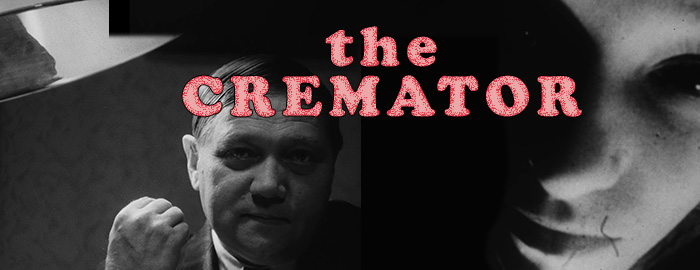
B&W, 1968, 99 mins. 55 secs.
Directed by Juraj Herz
Starring Rudolf Hrusínský, Vlasta Chramostová, Jana Stehnová, Milos Vognic
Second Run (Blu-ray & DVD) (UK R0 HD/PAL), Criterion (Blu-ray & DVD) (US RA/R1 HD/NTSC), Dark Sky (US R1 NTSC) / WS (1.66:1) (16:9)
The 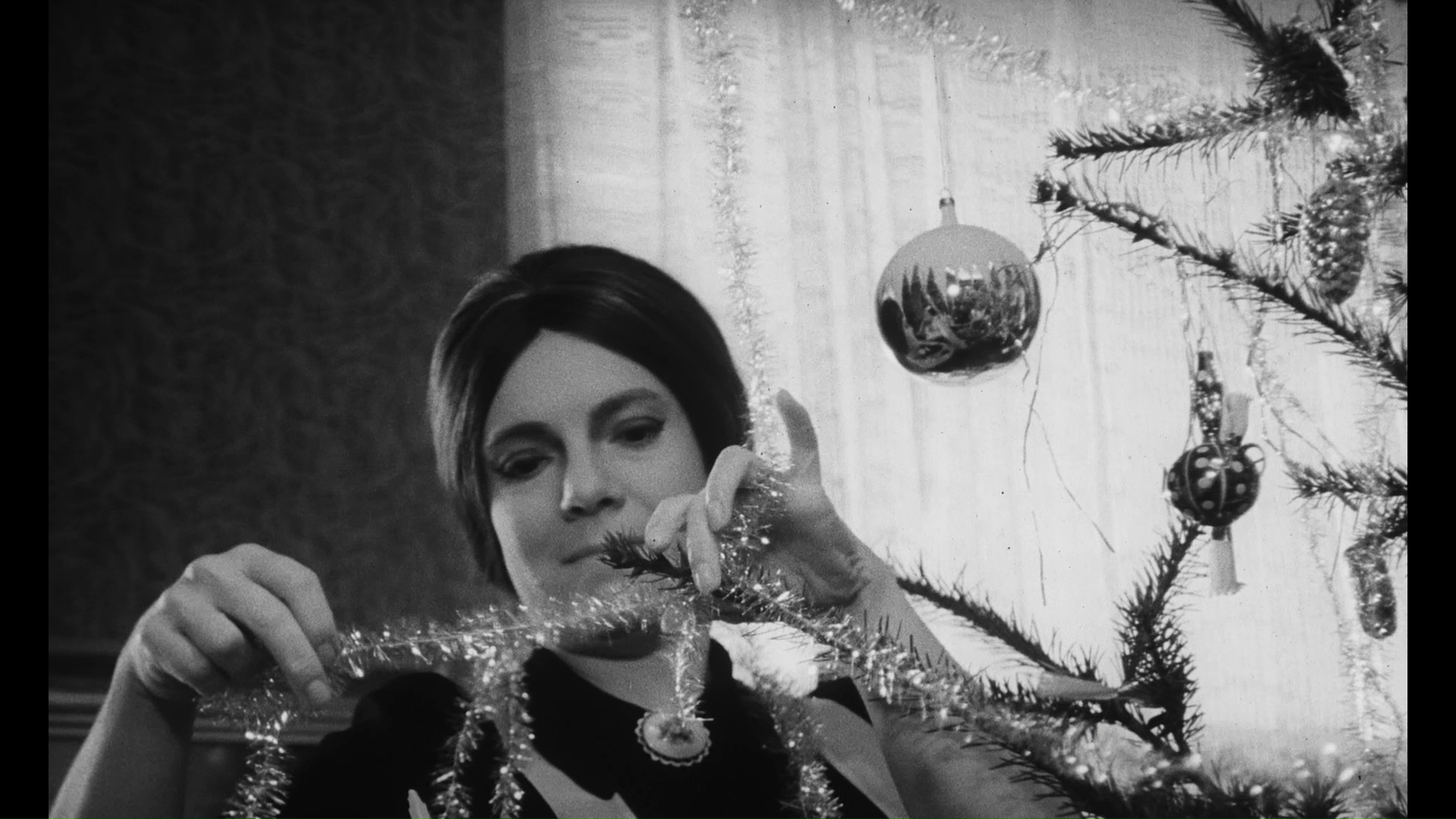 name of director Juraj
name of director Juraj 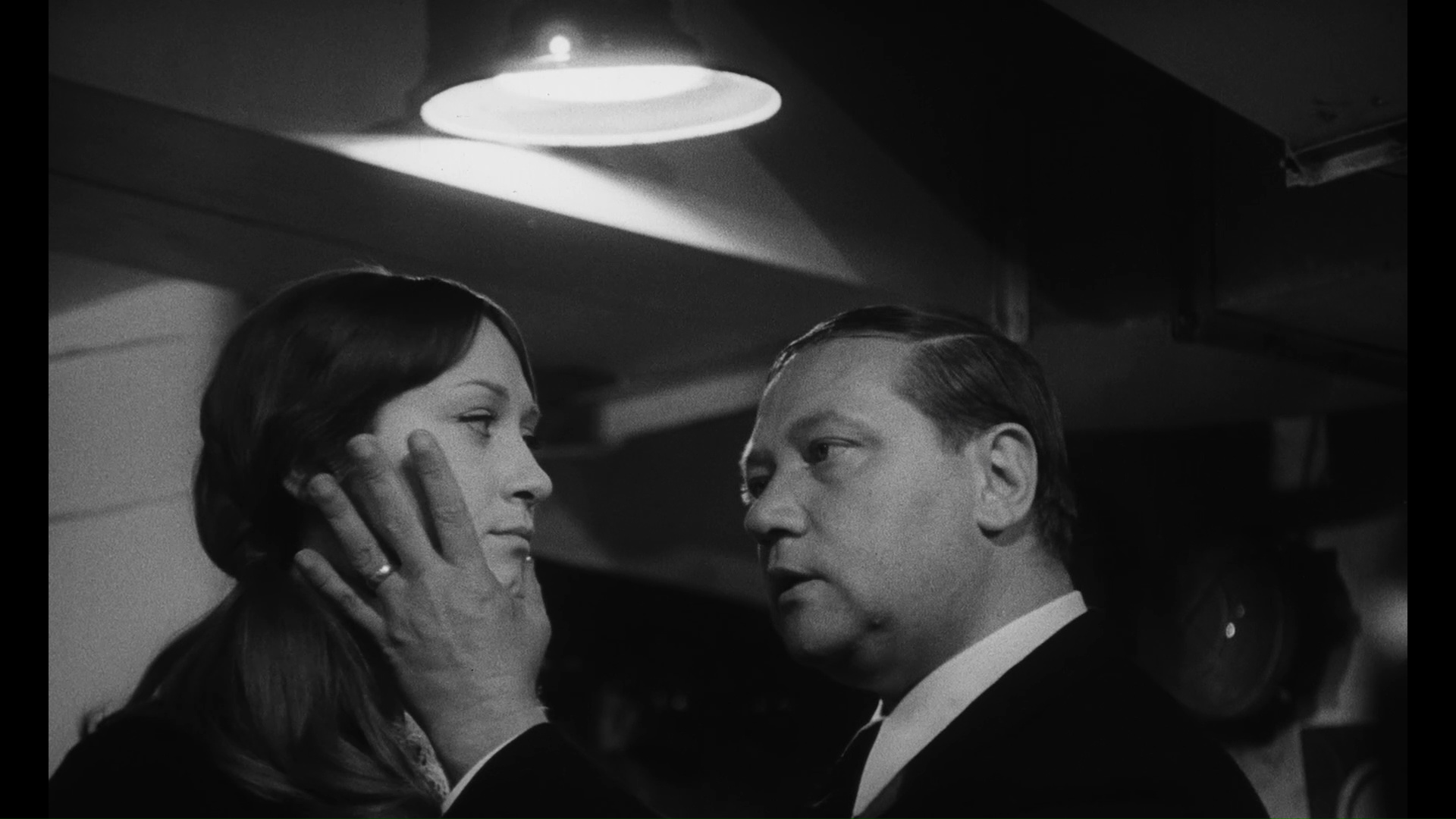 Herz wasn't encountered very often outside film festivals and a few select European countries until the couple of decades, primarily thanks to the sudden reappraisal of his landmark Czech political horror film, The Cremator, which caused something of a stir three years after its initial release by racking up three awards at the Sitges Film Festival in 1972. A stylized, disturbing character study also functioning as a less than flattering national portrait on the eve of Nazi occupation, it charts the dark voyage of Kopfrkingl (longtime Czech film veteran Hrusínský) whose passion for his daily work at a crematorium allows him to fantasize about using the same procedure to purify the social corruption around him. Inspired by a mixture of perverse sexual mania (a combination of creepy brothel shows, a dysfunctional sex life with his wife Chramostová, and an obsession with being diagnosed with VD) and peculiar affinities with Tibetan Buddhism, he senses a new purpose when a former WWI colleague instructs him to use his German heritage as a tool for advancement. Of course, the fact that his wife is half-Jewish might be a bit of a problem, not to mention the hereditary implications this carries to his own two children.
Herz wasn't encountered very often outside film festivals and a few select European countries until the couple of decades, primarily thanks to the sudden reappraisal of his landmark Czech political horror film, The Cremator, which caused something of a stir three years after its initial release by racking up three awards at the Sitges Film Festival in 1972. A stylized, disturbing character study also functioning as a less than flattering national portrait on the eve of Nazi occupation, it charts the dark voyage of Kopfrkingl (longtime Czech film veteran Hrusínský) whose passion for his daily work at a crematorium allows him to fantasize about using the same procedure to purify the social corruption around him. Inspired by a mixture of perverse sexual mania (a combination of creepy brothel shows, a dysfunctional sex life with his wife Chramostová, and an obsession with being diagnosed with VD) and peculiar affinities with Tibetan Buddhism, he senses a new purpose when a former WWI colleague instructs him to use his German heritage as a tool for advancement. Of course, the fact that his wife is half-Jewish might be a bit of a problem, not to mention the hereditary implications this carries to his own two children.
A simple synopsis doesn't really convey the wild, often startling creative fever running through The Cremator from its creepy, animated opening credits to its delirious fantasy sequences. The film's Nazi themes 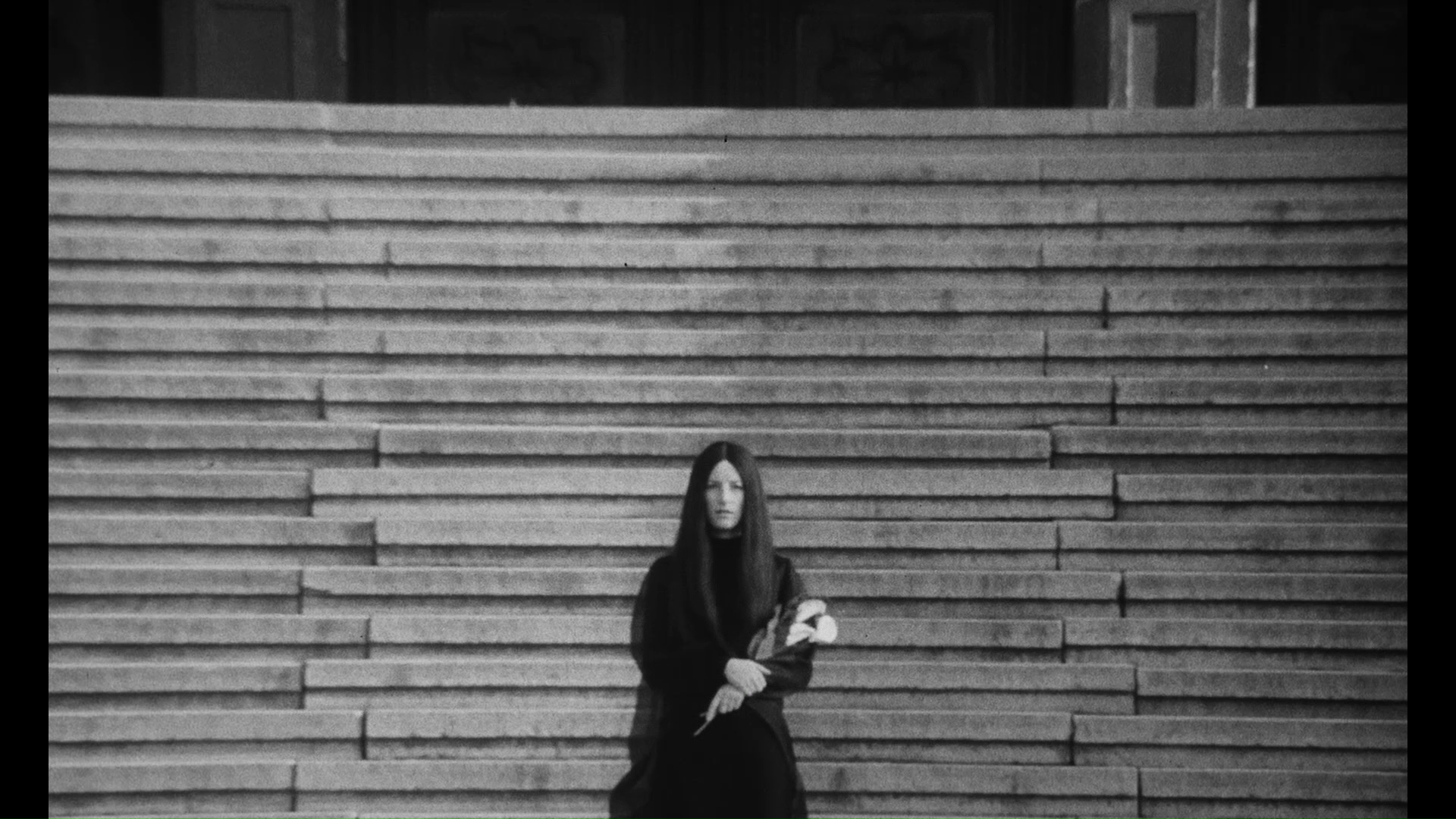 will strike many film fans as akin to the similar themes found in some of Ken Russell's work around the same time (especially his still-banned Dance of the Seven Veils), though the
will strike many film fans as akin to the similar themes found in some of Ken Russell's work around the same time (especially his still-banned Dance of the Seven Veils), though the 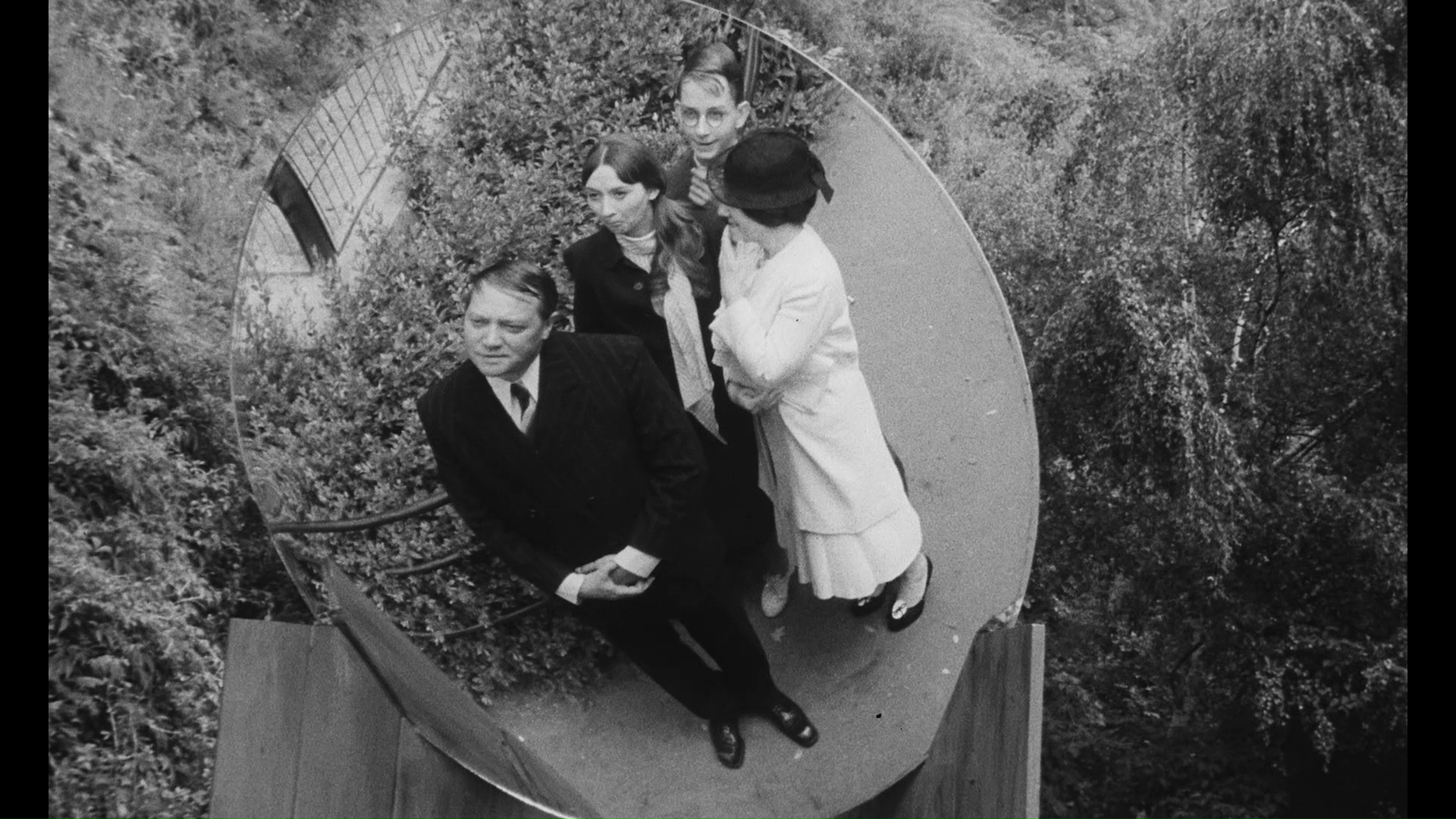 treatment here is much closer to pure horror. The film's central performance keeps the narrative percolating as steadily as Herz's inventive visuals, while the Nazi threat remains mostly off camera and becomes all the creepier because of it.
Herz remains busy today, churning out about a film a year almost always with horror overtones. One of his more recent, Darkness, even earned an American DVD release and is covered here. The vast majority of his '70s and and '80s output remains difficult to see, though fortunately other key titles like Morgiana and Beauty and the Beast have been revived as well.
treatment here is much closer to pure horror. The film's central performance keeps the narrative percolating as steadily as Herz's inventive visuals, while the Nazi threat remains mostly off camera and becomes all the creepier because of it.
Herz remains busy today, churning out about a film a year almost always with horror overtones. One of his more recent, Darkness, even earned an American DVD release and is covered here. The vast majority of his '70s and and '80s output remains difficult to see, though fortunately other key titles like Morgiana and Beauty and the Beast have been revived as well.
The Cremator first appeared on English-friendly DVD from Second Run in the UK as a region-free release with a solid anamorphic transfer correctly framed at 1.66:1. The monochromatic photography looks a little rough in spots due to the frequent opticals and what appears to be some uneven film stock, but it's as good a representation as one could want. Extras include an intro (12m22s) 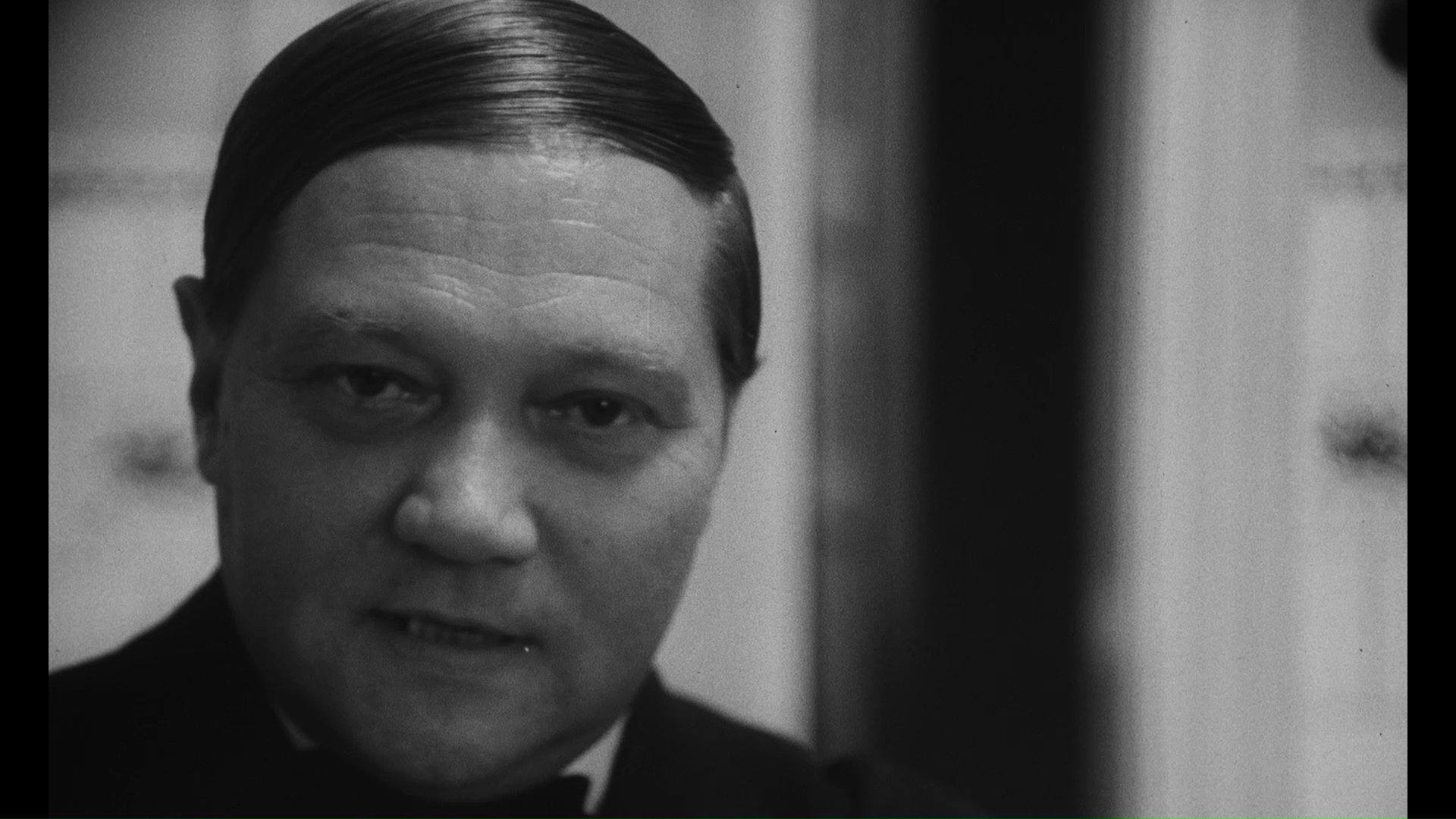
 by the Quay Brothers (whose Gothic Eastern European animation is strongly informed by Czech horror and fantasy as well as animator Jan Svenkmajer) and a booklet essay by critic Daniel Bird. A subsequent American release by Dark Sky uses the same transfer but doesn't carry over the extras and is a bit pricier to boot.
by the Quay Brothers (whose Gothic Eastern European animation is strongly informed by Czech horror and fantasy as well as animator Jan Svenkmajer) and a booklet essay by critic Daniel Bird. A subsequent American release by Dark Sky uses the same transfer but doesn't carry over the extras and is a bit pricier to boot.
In 2017, Second Run bowed the film on Blu-ray with a fantastic new HD transfer overseen by the Czech National Film Archive. Detail is improved significantly and looks startling even in wide outdoor shots, with perfect deep blacks giving the entire presentation a fine sense of depth. The Quay Brothers intro is ported over, as is the original liner notes booklet. However, you get three substantial new extras as well kicking off with a fine new audio commentary by the always perceptive and enjoyable Kat Ellinger. Her enthusiasm for the film is infectious as she tackles the source novel, the production history, the appeal of Herz's cinema, and the unusual balance of horror, fantasy, and political commentary in the film. Herz's 1965 short film "The Junk Shop" (31m37s), is also included and makes for a fantastic companion piece; originally intended for the 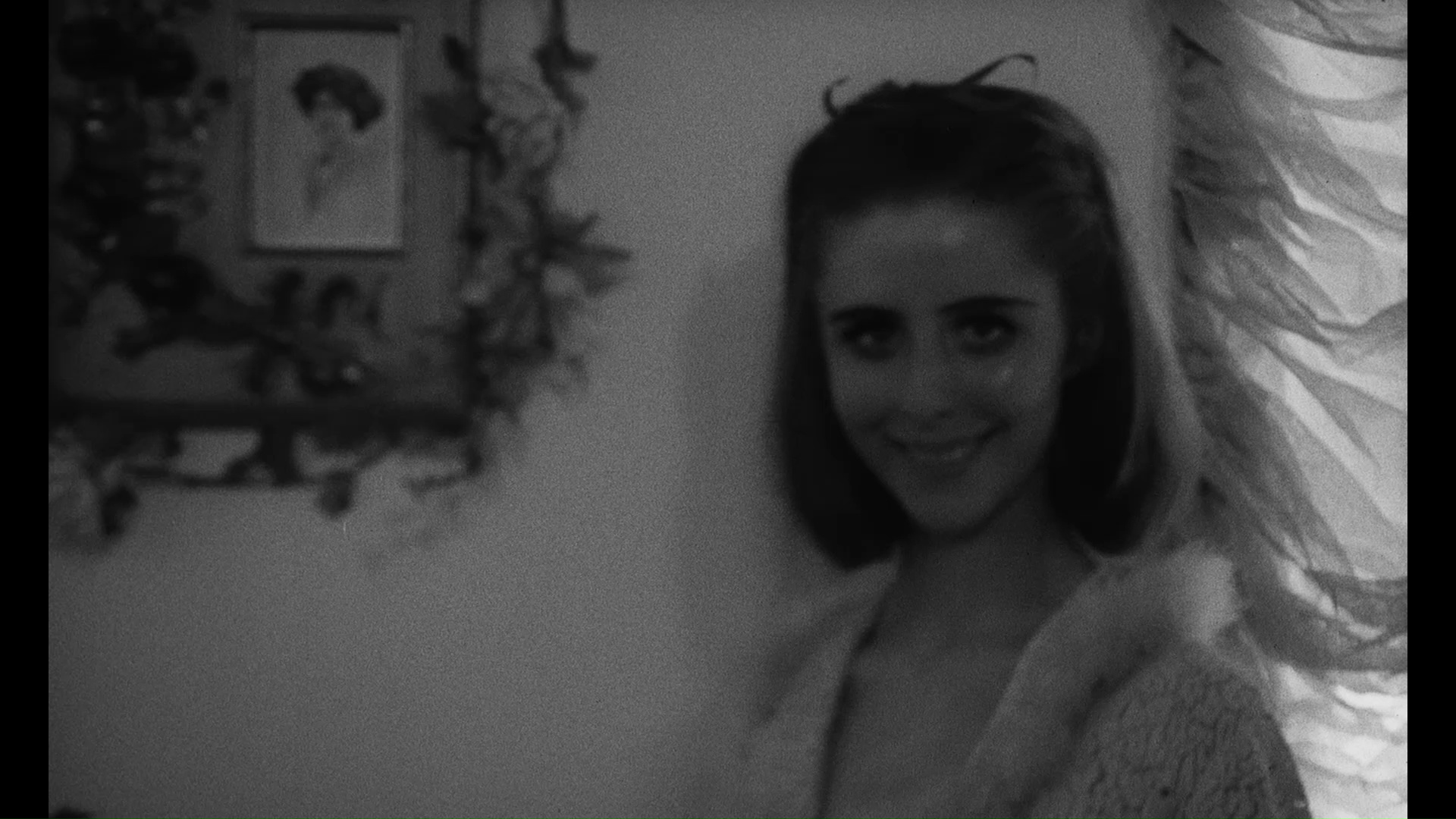 Czech New Wave anthology
Czech New Wave anthology 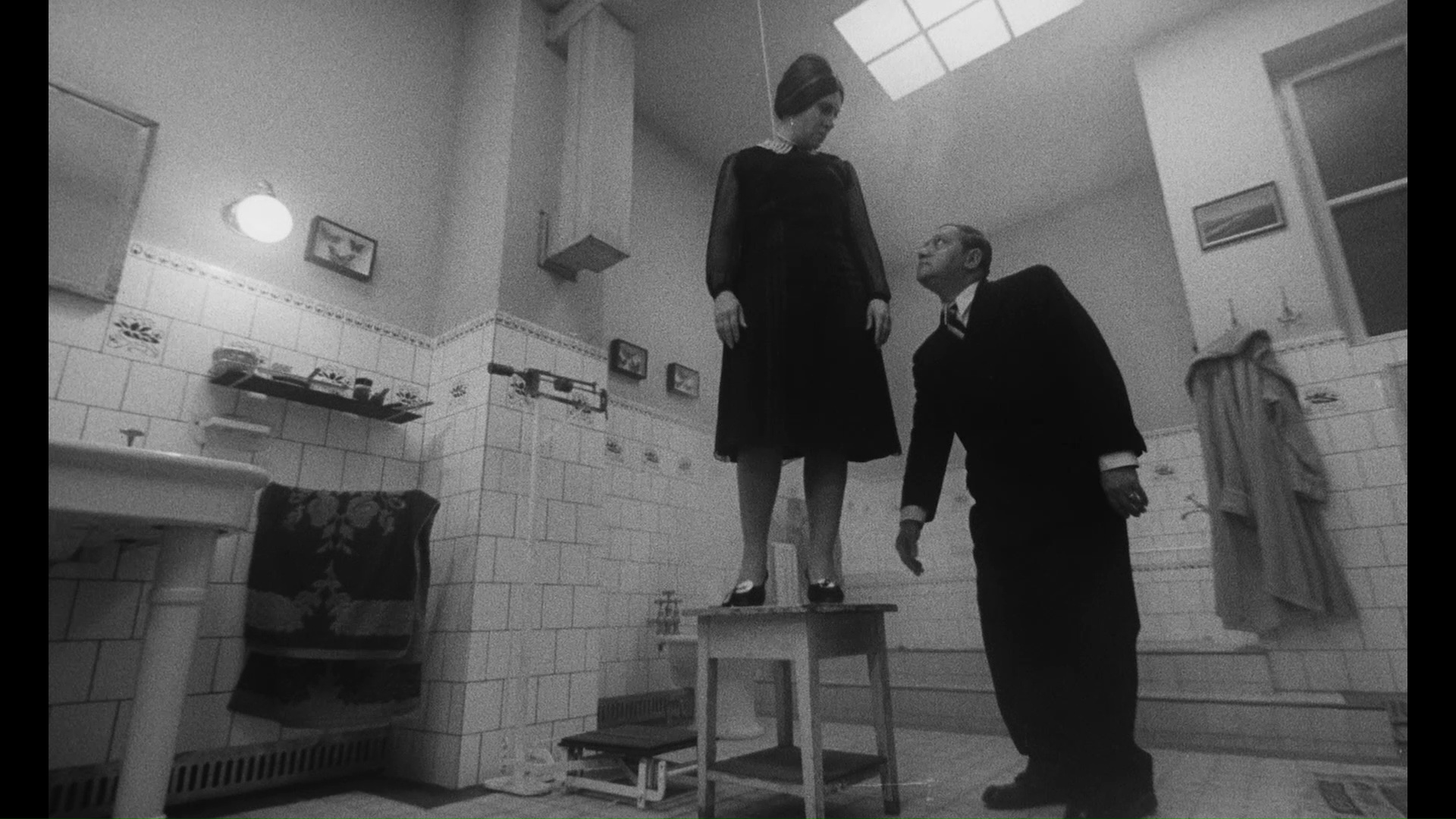 film Pearls of the Deep, it's a quirky and surreal depiction of a colorful owner of - yep - a junk shop and the local denizens who wander through over the course of a day, with a colorful avalanche of trinkets turning up ranging from dismembered angel statues to heaps of paper with everything from a squawking goose to an opera singer popping up along the way. Photo montages and even some animation also figure in the crazy mix, resulting in a prime slice of rebellious Czech cinema at its most buoyant. Finally a podcast episode from The Projection Booth is included in its entirely as an alternate audio track for the main feature with Mike White and Samm Deighan having a freeform discussion bringing in everything from Peter Lorre to Roger Corman as they expound upon the film's unique charms. That release was followed by a U.S. Blu-ray from Criterion taken from the same excellent restoration, with extras including "The Junk Shop," a 2011 Herz interview doc, an interview with film programmer Irena Kovarova, a 2017 doc about composer Zdeněk Liška featuring Herz, Jan Švankmajer and the Quay Brothers among others, a 1993 interview with Hrušínský, and the trailer, plus liner notes by Jonathan Owen.
film Pearls of the Deep, it's a quirky and surreal depiction of a colorful owner of - yep - a junk shop and the local denizens who wander through over the course of a day, with a colorful avalanche of trinkets turning up ranging from dismembered angel statues to heaps of paper with everything from a squawking goose to an opera singer popping up along the way. Photo montages and even some animation also figure in the crazy mix, resulting in a prime slice of rebellious Czech cinema at its most buoyant. Finally a podcast episode from The Projection Booth is included in its entirely as an alternate audio track for the main feature with Mike White and Samm Deighan having a freeform discussion bringing in everything from Peter Lorre to Roger Corman as they expound upon the film's unique charms. That release was followed by a U.S. Blu-ray from Criterion taken from the same excellent restoration, with extras including "The Junk Shop," a 2011 Herz interview doc, an interview with film programmer Irena Kovarova, a 2017 doc about composer Zdeněk Liška featuring Herz, Jan Švankmajer and the Quay Brothers among others, a 1993 interview with Hrušínský, and the trailer, plus liner notes by Jonathan Owen.
Reviewed on December 17, 2017


 name of director Juraj
name of director Juraj  Herz wasn't encountered very often outside film festivals and a few select European countries until the couple of decades, primarily thanks to the sudden reappraisal of his landmark Czech political horror film, The Cremator, which caused something of a stir three years after its initial release by racking up three awards at the Sitges Film Festival in 1972. A stylized, disturbing character study also functioning as a less than flattering national portrait on the eve of Nazi occupation, it charts the dark voyage of Kopfrkingl (longtime Czech film veteran Hrusínský) whose passion for his daily work at a crematorium allows him to fantasize about using the same procedure to purify the social corruption around him. Inspired by a mixture of perverse sexual mania (a combination of creepy brothel shows, a dysfunctional sex life with his wife Chramostová, and an obsession with being diagnosed with VD) and peculiar affinities with Tibetan Buddhism, he senses a new purpose when a former WWI colleague instructs him to use his German heritage as a tool for advancement. Of course, the fact that his wife is half-Jewish might be a bit of a problem, not to mention the hereditary implications this carries to his own two children.
Herz wasn't encountered very often outside film festivals and a few select European countries until the couple of decades, primarily thanks to the sudden reappraisal of his landmark Czech political horror film, The Cremator, which caused something of a stir three years after its initial release by racking up three awards at the Sitges Film Festival in 1972. A stylized, disturbing character study also functioning as a less than flattering national portrait on the eve of Nazi occupation, it charts the dark voyage of Kopfrkingl (longtime Czech film veteran Hrusínský) whose passion for his daily work at a crematorium allows him to fantasize about using the same procedure to purify the social corruption around him. Inspired by a mixture of perverse sexual mania (a combination of creepy brothel shows, a dysfunctional sex life with his wife Chramostová, and an obsession with being diagnosed with VD) and peculiar affinities with Tibetan Buddhism, he senses a new purpose when a former WWI colleague instructs him to use his German heritage as a tool for advancement. Of course, the fact that his wife is half-Jewish might be a bit of a problem, not to mention the hereditary implications this carries to his own two children.
 will strike many film fans as akin to the similar themes found in some of Ken Russell's work around the same time (especially his still-banned Dance of the Seven Veils), though the
will strike many film fans as akin to the similar themes found in some of Ken Russell's work around the same time (especially his still-banned Dance of the Seven Veils), though the  treatment here is much closer to pure horror. The film's central performance keeps the narrative percolating as steadily as Herz's inventive visuals, while the Nazi threat remains mostly off camera and becomes all the creepier because of it.
Herz remains busy today, churning out about a film a year almost always with horror overtones. One of his more recent, Darkness, even earned an American DVD release and is covered here. The vast majority of his '70s and and '80s output remains difficult to see, though fortunately other key titles like Morgiana and Beauty and the Beast have been revived as well.
treatment here is much closer to pure horror. The film's central performance keeps the narrative percolating as steadily as Herz's inventive visuals, while the Nazi threat remains mostly off camera and becomes all the creepier because of it.
Herz remains busy today, churning out about a film a year almost always with horror overtones. One of his more recent, Darkness, even earned an American DVD release and is covered here. The vast majority of his '70s and and '80s output remains difficult to see, though fortunately other key titles like Morgiana and Beauty and the Beast have been revived as well.
 by the Quay Brothers (whose Gothic Eastern European animation is strongly informed by Czech horror and fantasy as well as animator Jan Svenkmajer) and a booklet essay by critic Daniel Bird. A subsequent American release by Dark Sky uses the same transfer but doesn't carry over the extras and is a bit pricier to boot.
by the Quay Brothers (whose Gothic Eastern European animation is strongly informed by Czech horror and fantasy as well as animator Jan Svenkmajer) and a booklet essay by critic Daniel Bird. A subsequent American release by Dark Sky uses the same transfer but doesn't carry over the extras and is a bit pricier to boot.  Czech New Wave anthology
Czech New Wave anthology  film Pearls of the Deep, it's a quirky and surreal depiction of a colorful owner of - yep - a junk shop and the local denizens who wander through over the course of a day, with a colorful avalanche of trinkets turning up ranging from dismembered angel statues to heaps of paper with everything from a squawking goose to an opera singer popping up along the way. Photo montages and even some animation also figure in the crazy mix, resulting in a prime slice of rebellious Czech cinema at its most buoyant. Finally a podcast episode from The Projection Booth is included in its entirely as an alternate audio track for the main feature with Mike White and Samm Deighan having a freeform discussion bringing in everything from Peter Lorre to Roger Corman as they expound upon the film's unique charms. That release was followed by a U.S. Blu-ray from Criterion taken from the same excellent restoration, with extras including "The Junk Shop," a 2011 Herz interview doc, an interview with film programmer Irena Kovarova, a 2017 doc about composer Zdeněk Liška featuring Herz, Jan Švankmajer and the Quay Brothers among others, a 1993 interview with Hrušínský, and the trailer, plus liner notes by Jonathan Owen.
film Pearls of the Deep, it's a quirky and surreal depiction of a colorful owner of - yep - a junk shop and the local denizens who wander through over the course of a day, with a colorful avalanche of trinkets turning up ranging from dismembered angel statues to heaps of paper with everything from a squawking goose to an opera singer popping up along the way. Photo montages and even some animation also figure in the crazy mix, resulting in a prime slice of rebellious Czech cinema at its most buoyant. Finally a podcast episode from The Projection Booth is included in its entirely as an alternate audio track for the main feature with Mike White and Samm Deighan having a freeform discussion bringing in everything from Peter Lorre to Roger Corman as they expound upon the film's unique charms. That release was followed by a U.S. Blu-ray from Criterion taken from the same excellent restoration, with extras including "The Junk Shop," a 2011 Herz interview doc, an interview with film programmer Irena Kovarova, a 2017 doc about composer Zdeněk Liška featuring Herz, Jan Švankmajer and the Quay Brothers among others, a 1993 interview with Hrušínský, and the trailer, plus liner notes by Jonathan Owen.